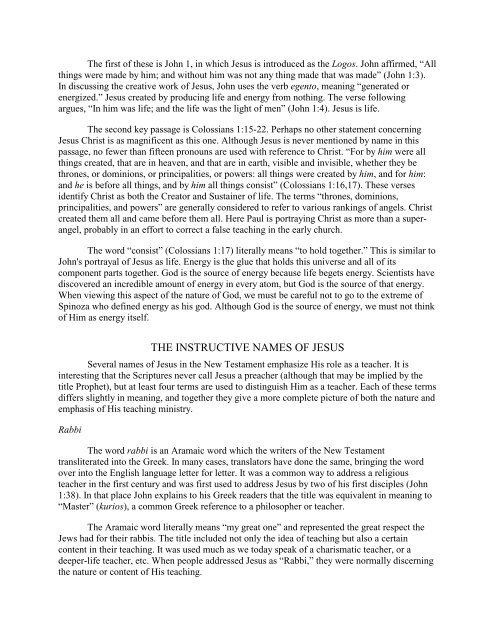The Names of Jesus - Elmer Towns
The Names of Jesus - Elmer Towns
The Names of Jesus - Elmer Towns
- TAGS
- elmer
- towns
- elmertowns.com
Create successful ePaper yourself
Turn your PDF publications into a flip-book with our unique Google optimized e-Paper software.
<strong>The</strong> first <strong>of</strong> these is John 1, in which <strong>Jesus</strong> is introduced as the Logos. John affirmed, “All<br />
things were made by him; and without him was not any thing made that was made” (John 1:3).<br />
In discussing the creative work <strong>of</strong> <strong>Jesus</strong>, John uses the verb egento, meaning “generated or<br />
energized.” <strong>Jesus</strong> created by producing life and energy from nothing. <strong>The</strong> verse following<br />
argues, “In him was life; and the life was the light <strong>of</strong> men” (John 1:4). <strong>Jesus</strong> is life.<br />
<strong>The</strong> second key passage is Colossians 1:15-22. Perhaps no other statement concerning<br />
<strong>Jesus</strong> Christ is as magnificent as this one. Although <strong>Jesus</strong> is never mentioned by name in this<br />
passage, no fewer than fifteen pronouns are used with reference to Christ. “For by him were all<br />
things created, that are in heaven, and that are in earth, visible and invisible, whether they be<br />
thrones, or dominions, or principalities, or powers: all things were created by him, and for him:<br />
and he is before all things, and by him all things consist” (Colossians 1:16,17). <strong>The</strong>se verses<br />
identify Christ as both the Creator and Sustainer <strong>of</strong> life. <strong>The</strong> terms “thrones, dominions,<br />
principalities, and powers” are generally considered to refer to various rankings <strong>of</strong> angels. Christ<br />
created them all and came before them all. Here Paul is portraying Christ as more than a superangel,<br />
probably in an effort to correct a false teaching in the early church.<br />
<strong>The</strong> word “consist” (Colossians 1:17) literally means “to hold together.” This is similar to<br />
John's portrayal <strong>of</strong> <strong>Jesus</strong> as life. Energy is the glue that holds this universe and all <strong>of</strong> its<br />
component parts together. God is the source <strong>of</strong> energy because life begets energy. Scientists have<br />
discovered an incredible amount <strong>of</strong> energy in every atom, but God is the source <strong>of</strong> that energy.<br />
When viewing this aspect <strong>of</strong> the nature <strong>of</strong> God, we must be careful not to go to the extreme <strong>of</strong><br />
Spinoza who defined energy as his god. Although God is the source <strong>of</strong> energy, we must not think<br />
<strong>of</strong> Him as energy itself.<br />
THE INSTRUCTIVE NAMES OF JESUS<br />
Several names <strong>of</strong> <strong>Jesus</strong> in the New Testament emphasize His role as a teacher. It is<br />
interesting that the Scriptures never call <strong>Jesus</strong> a preacher (although that may be implied by the<br />
title Prophet), but at least four terms are used to distinguish Him as a teacher. Each <strong>of</strong> these terms<br />
differs slightly in meaning, and together they give a more complete picture <strong>of</strong> both the nature and<br />
emphasis <strong>of</strong> His teaching ministry.<br />
Rabbi<br />
<strong>The</strong> word rabbi is an Aramaic word which the writers <strong>of</strong> the New Testament<br />
transliterated into the Greek. In many cases, translators have done the same, bringing the word<br />
over into the English language letter for letter. It was a common way to address a religious<br />
teacher in the first century and was first used to address <strong>Jesus</strong> by two <strong>of</strong> his first disciples (John<br />
1:38). In that place John explains to his Greek readers that the title was equivalent in meaning to<br />
“Master” (kurios), a common Greek reference to a philosopher or teacher.<br />
<strong>The</strong> Aramaic word literally means “my great one” and represented the great respect the<br />
Jews had for their rabbis. <strong>The</strong> title included not only the idea <strong>of</strong> teaching but also a certain<br />
content in their teaching. It was used much as we today speak <strong>of</strong> a charismatic teacher, or a<br />
deeper-life teacher, etc. When people addressed <strong>Jesus</strong> as “Rabbi,” they were normally discerning<br />
the nature or content <strong>of</strong> His teaching.
















